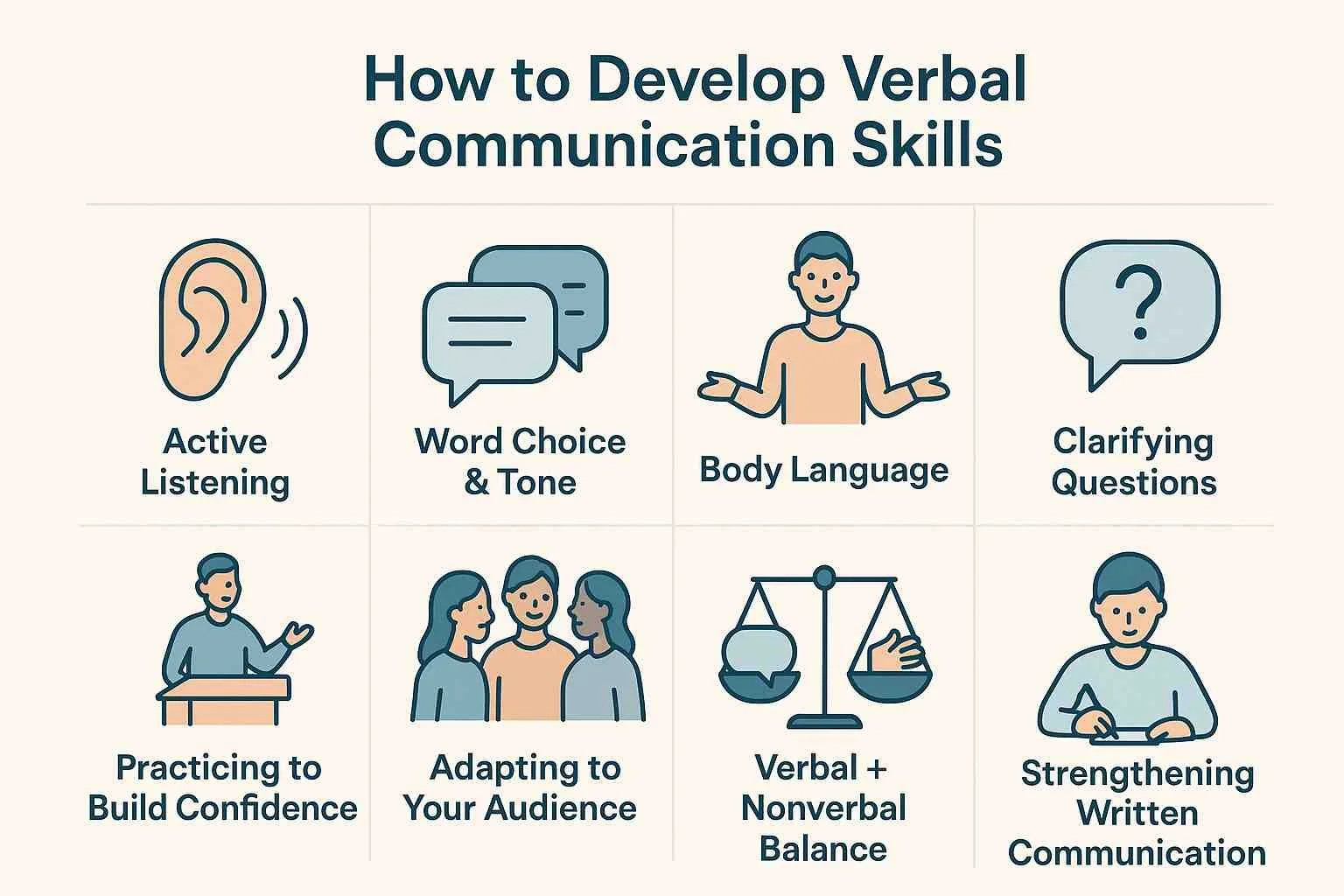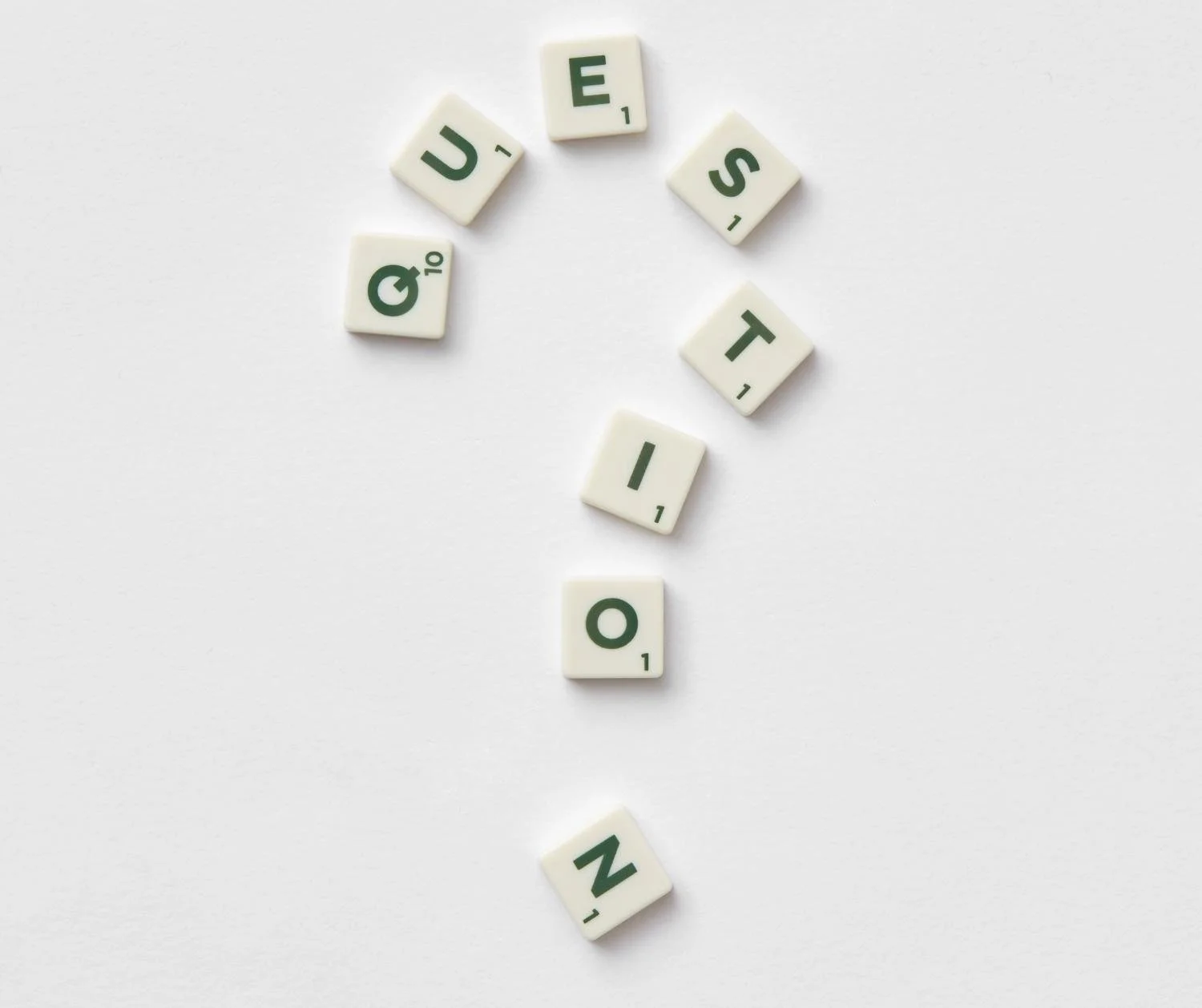How to Develop Verbal Communication Skills
Strong verbal communication shapes how we connect, solve problems, and build trust. Every conversation, meeting, or presentation depends on how clearly ideas are shared and received. The ability to speak with confidence and listen with intent influences personal and professional growth.
This article outlines practical strategies for enhancing verbal communication skills through active listening, tone control, body language, and audience awareness. Each strategy helps you express thoughts clearly and understand others more effectively. By applying these methods, you can improve everyday interactions and create stronger connections in every setting.
Key Takeaways
Verbal communication includes speaking and listening clearly to express thoughts and feelings.
Body language, tone, and eye contact influence how your words are received.
Practicing active listening and asking clarifying questions improves understanding and builds rapport.
Strong communication skills increase confidence and create better connections in daily life.
Why Strong Communication Skills Matter
How to Develop Verbal Communication Skills
How to Assess and Improve Communication Skills
Frequently Asked Questions About Developing Verbal Communication Skills
Why Strong Communication Skills Matter
Verbal communication enables people to share messages effectively through words, tone, and pacing. It plays a significant role in how others interpret your intentions, emotions, and professionalism. People with strong communication skills tend to experience greater success and stronger relationships.
Effective verbal communication can enhance teamwork and minimize misunderstandings. A steady voice, calm tone, and precise word choice show control and confidence. These qualities matter during meetings, presentations, and one-on-one conversations.
Effective communication also builds emotional awareness. When we speak clearly and listen with an open mind, we create a respectful exchange that deepens trust.
How to Develop Verbal Communication Skills
To develop verbal communication skills, focus on both speaking and listening. Communication is a two-way process that involves awareness, reflection, and consistent practice. The following strategies can help you communicate effectively in different settings.
1. Practice Active Listening
Active listening means paying full attention to the speaker, both verbally and nonverbally. It requires focus, patience, and genuine interest.
To improve active listening:
Maintain steady eye contact to show focus.
Avoid interrupting, even when you have something to add.
Reflect what you heard by asking clarifying questions or summarizing key points.
Notice nonverbal cues such as tone and facial expressions to understand emotions.
Active listening shows respect and builds strong relationships. It helps both people feel heard, understood, and valued.
2. Improve Word Choice and Tone
Your word choice and tone affect how others receive your message. Speaking eloquently, with clear, concise language, helps others grasp your main ideas.
Speak with calm confidence, especially during professional conversations. Avoid filler words, and organize your thoughts before responding. Practicing with a trusted colleague or recording your voice can help you hear how your tone sounds to others.
Tone can create or break rapport. A friendly tone shows respect and helps build trust, while a harsh one can create tension.
3. Use Body Language to Support Effective Communication
Body language supports your spoken words by showing emotion and confidence. It includes gestures, posture, and facial expressions, which often reveal how you feel before you speak.
For instance, leaning forward during a conversation can show engagement, while crossed arms may signal defensiveness. A smile or nod encourages openness and helps create a connection.
To strengthen this skill, observe how your nonverbal cues match your words. Practice standing tall and maintaining natural eye contact to project confidence.
4. Ask Clarifying Questions to Strengthen Communication Skills
Clarifying questions improve communication by confirming that you understood the message. They also encourage others to explain ideas more clearly.
Phrases like “Can you explain that part again?” or “Do you mean we should start next week?” help prevent confusion. They show that you care about accuracy and want to collaborate.
This habit strengthens communication skills at work and home. It promotes better communication and demonstrates respect for the speaker.
5. Build Confidence Through Practicing Verbal Communication
Confidence grows through consistent practice. The more often you speak in different settings, the stronger your verbal communication skills become.
Try presenting in meetings, joining a community group, or discussing topics that challenge your thinking. Each situation helps you manage your tone, pacing, and body language more effectively.
Feedback is key. Ask a trusted colleague or mentor to observe and share their perspective. Their feedback helps refine your communication style and improve your overall performance.
6. Adapt Communication Skills to Fit Your Audience
Good communicators adjust their message to fit their audience. Speaking to a supervisor during a performance review requires a different approach than talking to a friend.
Adapt your word choice, tone, and examples to the listener’s background and expectations. This flexibility helps you communicate effectively and gain buy-in from others.
In business settings, adapting your approach helps you create understanding and build long-term relationships.
7. Combine Verbal and Nonverbal Communication for Stronger Messages
Strong communication blends verbal and nonverbal cues to express meaning clearly. When your gestures match your words, your message feels more natural and trustworthy.
For example, maintaining eye contact shows interest, and nodding signals understanding. Aligning your words with your body language increases the impact of your message.
This balance helps you become a more effective communicator, which is key to teamwork and leadership.
8. Keep Verbal Communication Concise and Clear
Being concise shows respect for your listener’s time and attention. Use as few words as possible to share important points clearly.
Organize your thoughts before speaking to keep your message on track. When discussing complex subjects, pause briefly to allow your audience to absorb your words.
Short, direct messages make problem-solving and collaboration easier. They also show that you have confidence in your ideas.
9. Strengthen Written Communication to Support Speaking Skills
Written communication complements verbal communication by helping organize your thoughts before speaking. Writing teaches structure, clarity, and tone awareness.
Practice by summarizing key ideas or creating short outlines before a meeting. Review your writing to check for clarity and concise language. These habits carry over into speaking, making you a stronger communicator.
Writing also helps identify patterns in your communication style that you can refine during speech or presentations.
How to Assess and Improve Communication Skills
Self-assessment helps measure your progress and recognize where you can grow. Reflect on how often you communicate effectively and how others respond to your words.
Ask yourself:
Do people often ask for clarification?
Do I interrupt before others finish speaking?
Is my message clear and easy to understand?
Observing your interactions helps identify habits to improve. Over time, these small adjustments create lasting change in your communication skills.
Improve Verbal Communication Skills At Work
Find out how to improve verbal communication skills at work in this blog!
Frequently Asked Questions About Developing Verbal Communication Skills
1. What are verbal communication skills?
Verbal communication skills refer to how people express ideas through spoken words and tone. They include word choice, pacing, and body language, which help others interpret your message accurately. Strong skills help build confidence and rapport in personal and professional settings.
2. How can I improve my communication skills quickly?
You can develop communication skills by practicing active listening and speaking with confidence. Record yourself during conversations, notice how your tone sounds, and adjust where needed. Consistent practice helps you communicate effectively with different audiences. Ideally, you will practice your communication skills with a coach who can support you through the process.
3. Why is body language important in communication?
Body language expresses emotion and intent without words. Your posture, gestures, and facial expressions send strong signals about how you feel. Paying attention to these nonverbal cues helps you become a more effective communicator.
4. How does active listening help communication?
Active listening improves communication by helping people feel heard and understood. It involves paying attention, asking clarifying questions, and reflecting on what was said. This skill reduces misunderstandings and improves collaboration.
5. How do written communication skills support verbal communication?
Written communication skills strengthen how you organize and share ideas when speaking. Writing clearly teaches you to focus on main points, tone, and accuracy. This helps you express thoughts with confidence and connect better with your audience.
How Connected Speech Pathology Can Help
Connected Speech Pathology offers online communication coaching to help individuals develop effective verbal communication skills. Our professional communication coaches guide clients in enhancing clarity, tone, and confidence in their speaking.
We help clients refine their communication style through personalized strategies, including active listening practice, voice training, and body language awareness. Each session supports real-world goals, such as delivering better presentations, improving client communication, or enhancing daily conversations.
Online coaching makes it easy to access expert support and build relationships through improved communication from the comfort of home.
Summary
Developing verbal communication skills enhances relationships, boosts confidence, and fosters self-awareness. Listening actively, using positive body language, and speaking with clear intent help every conversation feel more productive.
These communication skills grow stronger with regular practice and feedback. Each conversation presents an opportunity to refine your message and enhance your connection with others.
When you learn to communicate effectively, you lead with confidence and create stronger bonds at work and home.
About the Author
Allison Geller is a communication coach, speech-language pathologist, and founder of Connected Speech Pathology, an international online practice providing professional communication coaching and speech therapy for children, teens, and adults. With more than two decades of experience, she has worked in medical and educational settings, published research on aphasia, and leads a team of specialists helping clients improve skills in public speaking, vocal presence, accent clarity, articulation, language, fluency, and interpersonal communication.








